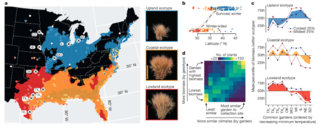Genomic mechanisms of climate adaptation in polyploid bioenergy switchgrass
J.T. Lovell et al. “Genomic mechanisms of climate adaptation in polyploid bioenergy switchgrass” Nature 590 (2021) [DOI: 10.1038/s41586-020-03127-1]
Long-term climate change and periodic environmental extremes threaten food and fuel security and global crop productivity. Although molecular and adaptive breeding strategies can buffer the effects of climatic stress and improve crop resilience, these approaches require sufficient knowledge of the genes that underlie productivity and adaptation—knowledge that has been limited to a small number of well-studied model systems. Here we present the assembly and annotation of the large and complex genome of the polyploid bioenergy crop switchgrass (Panicum virgatum). Analysis of biomass and survival among 732 resequenced genotypes, which were grown across 10 common gardens that span 1,800 km of latitude, jointly revealed extensive genomic evidence of climate adaptation. Climate–gene–biomass associations were abundant but varied considerably among deeply diverged gene pools. Furthermore, we found that gene flow accelerated climate adaptation during the postglacial colonization of northern habitats through introgression of alleles from a pre-adapted northern gene pool. The polyploid nature of switchgrass also enhanced adaptive potential through the fractionation of gene function, as there was an increased level of heritable genetic diversity on the nondominant subgenome. In addition to investigating patterns of climate adaptation, the genome resources and gene–trait associations developed here provide breeders with the necessary tools to increase switchgrass yield for the sustainable production of bioenergy.
